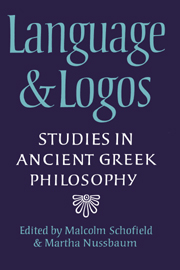Book contents
- Frontmatter
- Contents
- Preface
- Introduction
- 1 Heraclitus' conceptions of flux, fire and material persistence
- 2 Epistemology and meaning in Heraclitus
- 3 The dénouement of the Cratylus
- 4 Cratylus' theory of names and its refutation
- 5 Knowledge and language: the Theaetetus and the Cratylus
- 6 Falsehood and not-being in Plato's Sophist
- 7 Forms and dialectic in the second half of the Parmenides
- 8 Aristotle and the more accurate arguments
- 9 Aristotle on the principles of change in Physics I
- 10 Aristotle on natural teleology
- 11 Accidental unities
- 12 Aristotle's concept of signification
- 13 Saving Aristotle's appearances
- 14 Myths about non-propositional thought
- 15 Gods and heaps
- Bibliography of the publications of G. E. L. Owen
- Index locorum
- Index of names
14 - Myths about non-propositional thought
Published online by Cambridge University Press: 09 October 2009
- Frontmatter
- Contents
- Preface
- Introduction
- 1 Heraclitus' conceptions of flux, fire and material persistence
- 2 Epistemology and meaning in Heraclitus
- 3 The dénouement of the Cratylus
- 4 Cratylus' theory of names and its refutation
- 5 Knowledge and language: the Theaetetus and the Cratylus
- 6 Falsehood and not-being in Plato's Sophist
- 7 Forms and dialectic in the second half of the Parmenides
- 8 Aristotle and the more accurate arguments
- 9 Aristotle on the principles of change in Physics I
- 10 Aristotle on natural teleology
- 11 Accidental unities
- 12 Aristotle's concept of signification
- 13 Saving Aristotle's appearances
- 14 Myths about non-propositional thought
- 15 Gods and heaps
- Bibliography of the publications of G. E. L. Owen
- Index locorum
- Index of names
Summary
G. E. L. Owen's papers tend not only to transform their professed subject matter, but also to spread illumination into quite distant regions. The present distant region is no exception, as the footnotes will reveal.
Plotinus distinguished at least two kinds of thinking. There is dianoia, which is often called discursive thinking, and which is the activity of the soul (psuchē). And then there is the different activity of the intellect (nous), which is often called non-discursive thinking. It is commonly held that non-discursive thinking does not involve entertaining propositions. That is, it does not involve thinking that something is the case. Instead, one contemplates concepts in isolation from each other, and does not string them together in the way they are strung together in ‘that’-clauses. It is further supposed that Plato and Aristotle anticipated Plotinus in postulating this non-propositional thinking.
I have three aims in this chapter, The main one is to deny that non-propositional thinking is to be found in any of these three thinkers at the points where it has most commonly been detected. In order to show this for the case of Plotinus, I shall have to explain some of Aristotle's ideas about thinking and how Plotinus transformed them. He certainly did believe that there is a mystical state in which we have contact with something much simpler than any proposition. But I shall maintain that he regards this mystical experience as above the level of thinking, while thinking in its highest form he treats as propositional.
- Type
- Chapter
- Information
- Language and LogosStudies in Ancient Greek Philosophy Presented to G. E. L. Owen, pp. 295 - 314Publisher: Cambridge University PressPrint publication year: 1982
- 10
- Cited by



